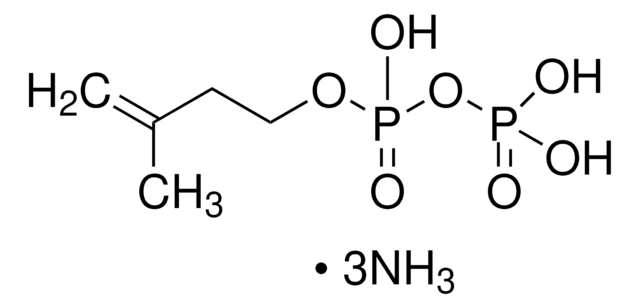MAK168
Pyrophosphate Assay Kit
sufficient for 200 fluorometric tests (Blue fluorescence)
Sinonimo/i:
High-Sensitivity Pyrophosphate Assay Kit
Autenticatiper visualizzare i prezzi riservati alla tua organizzazione & contrattuali
About This Item
Prodotti consigliati
impiego
sufficient for 200 fluorometric tests (Blue fluorescence)
applicazioni
cosmetics
food and beverages
Metodo di rivelazione
fluorometric
Temperatura di conservazione
−20°C
Descrizione generale
Pyrophosphate (PPi) is produced by a number of biochemical reactions such as ATP hydrolysis, DNA and RNA polymerizations, cyclic AMP formation, and the formation of fatty acid-coenzyme A esters. It is hydrolyzed by inorganic pyrophosphatase. PPi is present in the blood and in the extracellular matrix of tissues.
Compatibilità
The Pyrophosphate Assay Kit provides a simple and direct microplate assay procedure for measuring pyrophosphate in a variety of samples.
Principio
The pyrophosphate concentration of a sample is determined by the use of a unique fluorogenic pyrophosphate sensor in which the presence of pyrophosphate results in the production of a fluorescent product (λex =316/λem = 456 nm) proportional to the pyrophosphate present. This assay is simpler and more robust than traditional enzyme-based methods and is ideal for screening enzyme activity or enzyme inhibitors.
Avvertenze
Danger
Indicazioni di pericolo
Consigli di prudenza
Classi di pericolo
Eye Dam. 1
Codice della classe di stoccaggio
10 - Combustible liquids
Classe di pericolosità dell'acqua (WGK)
WGK 3
Punto d’infiammabilità (°F)
188.6 °F
Punto d’infiammabilità (°C)
87 °C
Certificati d'analisi (COA)
Cerca il Certificati d'analisi (COA) digitando il numero di lotto/batch corrispondente. I numeri di lotto o di batch sono stampati sull'etichetta dei prodotti dopo la parola ‘Lotto’ o ‘Batch’.
Possiedi già questo prodotto?
I documenti relativi ai prodotti acquistati recentemente sono disponibili nell’Archivio dei documenti.
I clienti hanno visto anche
Jithesh Kottur et al.
Nucleic acids research, 46(12), 5875-5885 (2018-06-01)
DNA synthesis by DNA polymerases (dPols) is central to duplication and maintenance of the genome in all living organisms. dPols catalyze the formation of a phosphodiester bond between the incoming deoxynucleoside triphosphate and the terminal primer nucleotide with the release
Peiyi Zheng et al.
Journal of molecular biology, 431(4), 764-776 (2019-01-18)
Phosphopantothenoylcysteine (PPC) synthetase (PPCS) catalyzes nucleoside triphosphate-dependent condensation reaction between 4'-phosphopantothenate (PPA) and l-cysteine to form PPC in CoA biosynthesis. The catalytic mechanism of PPCS has not been resolved yet. Coenzyme A biosynthesis protein 2 (Cab2) possesses activity of PPCS
Pyrophosphate hydrolysis is an intrinsic and critical step of the DNA synthesis reaction.
Kottur J and Deepak T N
Nucleic Acids Research (2018)
Tyler M Weaver et al.
Proceedings of the National Academy of Sciences of the United States of America, 117(41), 25494-25504 (2020-10-02)
During DNA replication, replicative DNA polymerases may encounter DNA lesions, which can stall replication forks. One way to prevent replication fork stalling is through the recruitment of specialized translesion synthesis (TLS) polymerases that have evolved to incorporate nucleotides opposite DNA
Young-Joo Yi et al.
PloS one, 7(4), e34524-e34524 (2012-04-10)
Inorganic pyrophosphate (PPi) is generated by ATP hydrolysis in the cells and also present in extracellular matrix, cartilage and bodily fluids. Fueling an alternative pathway for energy production in cells, PPi is hydrolyzed by inorganic pyrophosphatase (PPA1) in a highly
Il team dei nostri ricercatori vanta grande esperienza in tutte le aree della ricerca quali Life Science, scienza dei materiali, sintesi chimica, cromatografia, discipline analitiche, ecc..
Contatta l'Assistenza Tecnica.








